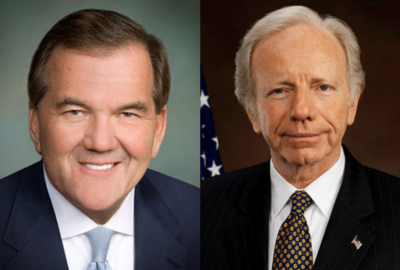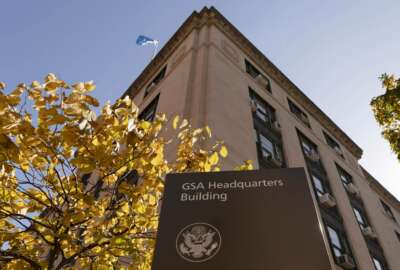If the government learned anything from the pandemic, it’s that an outbreak from nature has much in common with a biological attack — at least in terms of preparedness and response. Federal Drive with Tom Temin asked David Lasseter, former deputy assistant secretary of Defense for Countering Weapons of Mass Destruction, about the matter — starting with, has the thinking changed?
David Lasseter: The quick response is a yes. I mean, throughout this recent pandemic, through the planning and discussion about how to respond, and part of the discussions I had with other senior leaders across interagency is this, frankly, a bifurcation of public health like a traditional pandemic, and the public health response bifurcating that from a biological threat, even if it’s naturally occurring, but probably more precisely, those that may arise from a liability for those that are even a man made, or a deliberate release. So there’s been a lot of discussion, and I think you’ll see probably some meat or some information from those discussions over the course of the next number of months of ensuring that we’re really overlaying these two concerns and that to be prepared for a public health emergency, such as natural pandemic, we too have to be prepared for biological weapons, because taking consideration of COVID-19 whether there’s some debate, as you well know and discourse, throughout the country, from the intelligence community to around the world about origins. And so it’s important to understand that regardless of origin, we have to be prepared. And in my previous role at Department of Defense, my focus was on the warfighter, ensuring that the warfighter was protected and working with the Combat Defense Office and Defense Threat Reduction Agency to ensure that those mitigation measures and the protective measures were in place. So sure, that’s a long way, pardon me Tom, for saying yes. I mean, there’s a need to ensure that, that we’re, we’re overlaying these two concepts.
Tom Temin: Because in reality, as we saw from the incident on the aircraft carrier, the Theodore Roosevelt, that that was kind of the manifestation of how national security can, in fact, be affected by some kind of bio event, whether intentional or non-intentional, whether by an enemy or by natural causes, because a major asset of the Navy, and of the 11 carriers, we’ve got only five or six are ever operational at a given time as it is – to take one out in that manner could constitute a national security threat.
David Lasseter: You’re exactly right. And it wasn’t just the operational impact. Could the US military respond to contingency or threat to the homeland, our allies or partners? Absolutely, and could have done it and did do it in certain instances over the course of these last 19 months, but is absolutely certain that the pandemic impacted operations, impacted exercises, impacted throughput all the way down to recruit training. And with that, impacting that throughput, there’s obviously a cost impact. And so from the active component down to the reserve and guard components, there was certainly impact, and imagine a bio weapons impact, I think it would be much worse just on the psyche, that conceivably, on the very essence of whatever that biological weapon might be.
Tom Temin: And now you’re advising companies on developing defenses and biosecurity measures. From the standpoint of DoD, did the pandemic kind of cement or strengthen the need for great relationships with industry to help respond when something breaks?
David Lasseter: Yeah, absolutely. I think we saw from an all of us have seen from the results of operation warp speed and the incredible interaction, coordination all hours of the day, every day, for for many months, the relationships between department defense and HHS, and obviously the White House and national security professionals across US government, with those incredible biopharmaceutical companies and the broad biotech industry that wants to develop medical countermeasures. In this case, probably most clear to everyone being the vaccine, but also you know, therapeutics and, and also improvements in mitigation techniques, whether it’s testing that we’ve seen over the last year plus is greatly improved. Now that capability must remain now we must be able to tap into that in real time going forward. So there are so there are things that the government and specifically department defense most continue to invest in, in the private sector, you know, commercial off the shelf items. I was struck by comments last week at NDIA by some of our senior leaders within DoD, Dr. Vann acting assistant secretary for nuclear, chemical and biological defense, and Dr. Hann at DTRA, and others, Jason Roos at CBRND, talked about the need for the US government, in this case mainly DoD, to be working closely with industry and pulling in those capabilities.
Tom Temin: And what about bacterial infection threats, which have not been as much in the news these days, because we’re dealing with a viral type of infection where the response from industry is big, expensive, required billions of federal infusion to get these things done quickly, the vaccines that we now benefit from, those that choose to, but what about the bacterial side? Because prior to this, we were learning that the germs, the bacterial types of germs, were becoming more and more resistant to the well known remedies that we had in place for many years.
David Lasseter: Yeah, there’s a broad set of concerns. I mean, the threats, I’m not telling you anything you don’t know, but the threats continue to grow and emerge, and across the bio space, it is a lot of it based on growth, population growth, individuals easily moving from country to country, region or region, the proximity to natural habitats. But yes, I mean, the bacterial concerns are something that the US government and clearly industry are tracking. I would say that obviously when a pandemic like COVID emerges that does crowd out probably a lot of the work in other areas, it doesn’t mean that it is routed out to the point that there’s not a focus on it. But in my mind, there’s going to be broader attention to it especially as the department goes through posture reviews on how we can improve our bio defense capabilities and the White House. The current administration has obviously announced increased focus and attention to all these issues.
Tom Temin: And briefly tell us about the advisory role that you have with a company called Heat Biologics, which is trying to develop immune system responses to some of the threats we face. What’s going on there?
David Lasseter: Great company in North Carolina, has a robust platform that the company believes can respond to a variety of pathogens and biological threats, and really in the future be utilized as a response or medical countermeasure for any biothreat it’s quick and efficient. Heat Biologics has brought together a top tier team of leaders in the space. I think COVID encouraged the company to understand that critical need in America for a robust pandemic prevention program that can respond to any pathogen or virus that threatens Americans, and obviously by extension our partners and allies. To my knowledge, I think Heat is – guess I should say our knowledge – they’re the only ones doing anything like this specifically. There’s tons of threats out there., we could talk about specific ones, but there’s certain ones that you could imagine a capability like this could positively impact. And so I think you know, but the board is made up of former Senator Mark Pryor, former Assistant Secretary for Nuclear, Chemical & Biological, Andy Weber, former Congressman Jack Kingston and Dr. Gregory Koblentz, who’s the director of the bio-defense program at George Mason University. So really a stellar group of of experts, both from a congressional standpoint, but also former executive branch officials. So I’m honored to be a part of this team and I think it’s a novel, one of a kind, first impression type of board that I suspect others might try to emulate or replicate.






